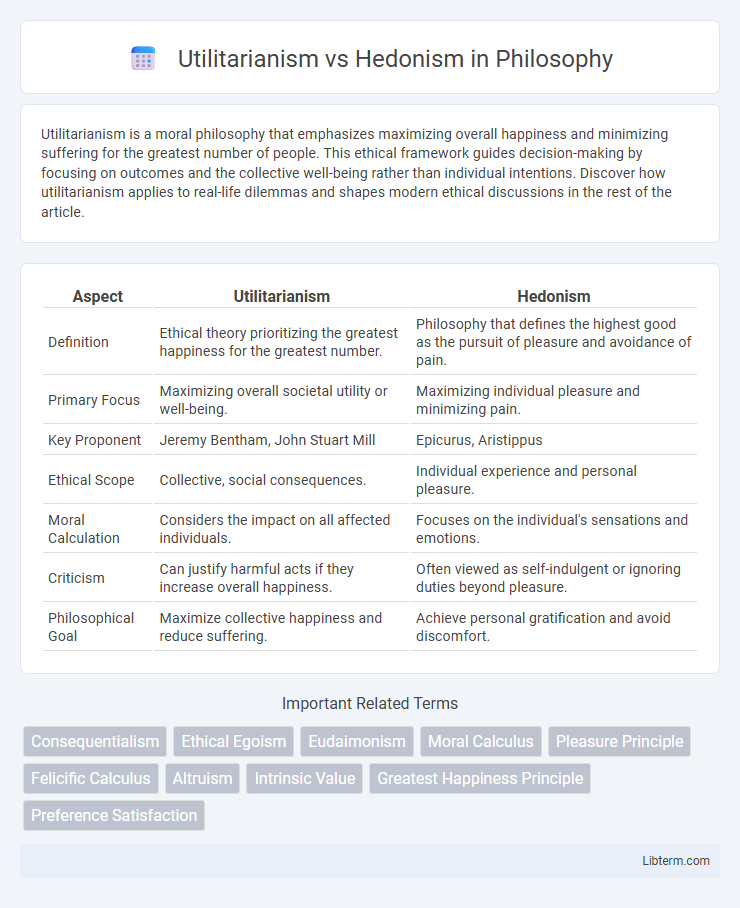Utilitarianism is a moral philosophy that emphasizes maximizing overall happiness and minimizing suffering for the greatest number of people. This ethical framework guides decision-making by focusing on outcomes and the collective well-being rather than individual intentions. Discover how utilitarianism applies to real-life dilemmas and shapes modern ethical discussions in the rest of the article.
Table of Comparison
| Aspect | Utilitarianism | Hedonism |
|---|---|---|
| Definition | Ethical theory prioritizing the greatest happiness for the greatest number. | Philosophy that defines the highest good as the pursuit of pleasure and avoidance of pain. |
| Primary Focus | Maximizing overall societal utility or well-being. | Maximizing individual pleasure and minimizing pain. |
| Key Proponent | Jeremy Bentham, John Stuart Mill | Epicurus, Aristippus |
| Ethical Scope | Collective, social consequences. | Individual experience and personal pleasure. |
| Moral Calculation | Considers the impact on all affected individuals. | Focuses on the individual's sensations and emotions. |
| Criticism | Can justify harmful acts if they increase overall happiness. | Often viewed as self-indulgent or ignoring duties beyond pleasure. |
| Philosophical Goal | Maximize collective happiness and reduce suffering. | Achieve personal gratification and avoid discomfort. |
Introduction to Utilitarianism and Hedonism
Utilitarianism is an ethical theory that emphasizes maximizing overall happiness and minimizing suffering, advocating actions that produce the greatest good for the greatest number. Hedonism, as a philosophical concept, focuses on pleasure as the highest good, suggesting that the pursuit of personal happiness and avoidance of pain are the primary motivations for human behavior. While utilitarianism considers collective well-being and impartiality, hedonism centers on individual pleasure and intrinsic enjoyment.
Historical Origins of Both Philosophies
Utilitarianism traces its roots to the 18th-century British philosophers Jeremy Bentham and John Stuart Mill, who emphasized maximizing overall happiness and minimizing suffering as the foundation of moral decision-making. Hedonism, with origins in ancient Greek philosophy, particularly the teachings of Epicurus, centers on the pursuit of pleasure and avoidance of pain as the highest good. Both philosophies have significantly influenced ethical theory by addressing the role of pleasure and utility in human motivation and moral evaluation.
Core Principles of Utilitarianism
Utilitarianism centers on maximizing overall happiness and minimizing suffering by evaluating actions based on their consequences, embodying the principle of "the greatest good for the greatest number." This ethical theory quantifies well-being, advocating decisions that yield the highest net utility across affected individuals. Unlike Hedonism, which prioritizes individual pleasure, Utilitarianism emphasizes collective welfare and impartial consideration of all parties involved.
Fundamental Tenets of Hedonism
Hedonism asserts that the pursuit of pleasure and the avoidance of pain are the primary drivers of human behavior, making pleasure the highest intrinsic good. Unlike utilitarianism, which emphasizes maximizing overall happiness for the greatest number, hedonism focuses on individual experiences and sensory enjoyment as the fundamental measure of well-being. The core tenet of hedonism holds that all actions should be evaluated based on their capacity to increase personal pleasure or reduce personal suffering.
Key Differences Between Utilitarianism and Hedonism
Utilitarianism evaluates actions based on their overall contribution to the greatest happiness for the greatest number, emphasizing collective well-being over individual pleasure. Hedonism centers on the pursuit of individual pleasure and the avoidance of pain as the primary or sole intrinsic goods. Unlike Hedonism, Utilitarianism incorporates the consequences of actions affecting all individuals impacted, not just the personal experiences of pleasure or pain.
Moral Implications and Ethical Reasoning
Utilitarianism evaluates moral actions based on their consequences, promoting the greatest happiness or benefit for the greatest number, which emphasizes collective well-being and impartiality in ethical reasoning. Hedonism centers on the pursuit of individual pleasure as the highest good, potentially challenging utilitarian principles by prioritizing personal happiness over broader social considerations. The moral implications of utilitarianism often involve balancing conflicting interests and justifying sacrifices for the majority, while hedonism raises questions about the ethical validity of seeking pleasure without regard for others.
Major Thinkers and Influencers
Utilitarianism, primarily developed by Jeremy Bentham and John Stuart Mill, emphasizes maximizing overall happiness and minimizing pain as the basis for moral decisions. Hedonism, with roots traced back to ancient philosophers like Epicurus, advocates for pleasure as the highest good, focusing on individual sensory and mental satisfaction. The contrast between Bentham's quantitative utility and Epicurus's qualitative pleasure highlights fundamental debates in ethical theory regarding the measurement and value of happiness.
Criticisms of Utilitarianism and Hedonism
Criticisms of Utilitarianism highlight its tendency to justify morally questionable actions by prioritizing the greatest overall happiness, potentially overlooking individual rights and justice. Hedonism faces challenges for reducing all values to pleasure, ignoring the complexity of human experiences and ethical considerations beyond mere sensory enjoyment. Both philosophies struggle with measuring and comparing subjective experiences, leading to practical difficulties in ethical decision-making.
Applications in Modern Society
Utilitarianism influences modern policy-making by promoting the greatest good for the greatest number, guiding decisions in healthcare, economics, and environmental ethics. Hedonism shapes consumer behavior and lifestyle choices, emphasizing pleasure and individual well-being as core motivations in areas such as marketing and personal wellness. Both philosophies impact contemporary debates on ethical consumption, public health strategies, and digital content regulation.
Conclusion: Weighing Utilitarianism Against Hedonism
Utilitarianism prioritizes the greatest good for the greatest number, emphasizing outcomes that maximize overall happiness and well-being, while Hedonism centers on the pursuit of individual pleasure as the highest intrinsic value. Weighing these philosophies involves balancing collective welfare against personal gratification, where Utilitarianism provides a broader ethical framework for societal decision-making and Hedonism offers a more subjective, pleasure-focused criteria. The conclusion highlights the practical advantages of Utilitarianism's communal approach in fostering long-term benefits over Hedonism's immediate, sensation-driven rewards.
Utilitarianism Infographic

 libterm.com
libterm.com